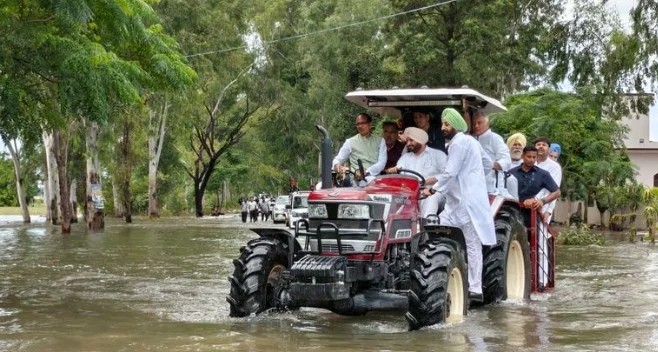GURDASPUR, Sept. 5 — A Union government team on Thursday declared Punjab’s agricultural economy “in grave danger” after touring flood-ravaged parts of Gurdaspur district, the state’s worst-hit region.
The two-member delegation, comprising Union Agriculture and Farmers Welfare Minister Shivraj Singh Chouhan and Minister of State for Railways Ravneet Bittu, said the scale of devastation threatened the livelihood of a majority of Punjabis who depend on farming. “Punjab’s economy is heavily reliant on agriculture. However, this success is threatened by the floods,” Chouhan said after visiting several villages.
Chouhan acknowledged that the Centre had initially underestimated the scale of the disaster. “Earlier, we did not believe the intensity of the floods. However, after seeing the damage ourselves, we got to know how deep the damage is,” he said. He noted that the Centre would extend full support for relief and rehabilitation measures.
The ministers were joined by an assessment team tasked with preparing a detailed report that, Chouhan noted, would form the basis of a possible financial relief package. Punjab Agriculture Minister Gurmeet Singh Khuddian, BJP Punjab president Sunil Jakhar, BJP national general secretary Tarun Chugh, Gurdaspur BJP president Baghel Singh, and former district president Shiv Bir Singh Rajan accompanied the delegation.
During his visit to Makoran Pattan village, Chouhan rode a tractor into submerged fields to inspect paddy crops flattened by days of flooding. “I can see thousands of acres of land on which paddy was grown but now has been flattened by the water,” he said while holding stalks of the damaged crop in his hands. “The silt brought by the Ravi River has been deposited in the agricultural fields, and there will be a crisis for the next crop. This is a dangerous phenomenon.”
Bittu, while reiterating that the Union government would not hesitate to extend financial assistance, pointed to Punjab’s high debt burden of about Rs 11,000 crore as a concern. “Nevertheless, the central government will go all out to bring Punjab back on track,” he said.
The team also toured Behrampur, the Kartarpur Corridor, and several villages of Dera Baba Nanak, where they interacted with residents and surveyed damage to homes, fields, and livestock. Farmers pleaded for immediate help, warning that their survival depended on urgent intervention.
“We request financial aid. We are already under debt and depend on the sale of paddy to clear our loans. However, this year, there will be no paddy to sell,” a farmer in Makoran Pattan told Chouhan.
Khuddian, briefing the central ministers, noted that beyond crop losses, Punjab had suffered significant casualties among both people and livestock. He urged that the state’s recovery plan must account for long-term damage to its agrarian base.

